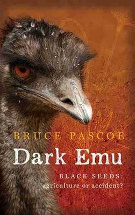Dark Emu: Black seeds: Agriculture or accident? by Bruce Pascoe

Magabala Books, 2014. ISBN 9781922142436.
(Age: Secondary) Aboriginal History. Agriculture. Indigenous people. Land rights. This very readable non-fiction work examines
the evidence for a revision of thinking about Aboriginal people at
the time of European colonial settlement. Pascoe presents compelling
arguments (often using the words of the early settlers and explorers
- those who created many of the early views of the Australian
indigenous people) to show that Aboriginal people did participate in
agriculture, and did create housing that suggested more sedentary
life styles, did engage in technological developments to assist them
in living successful lives. He establishes this to challenge our
education of current students that suggests that to be Aboriginal
was to be 'only' a hunter-gatherer. This paternalistic, and
self-promoting view at the expense of the Aboriginal success over
many years is revealed through discussions of agriculture, the use
of fire, the environmental wisdom of Aboriginal farming, and the
advantage of peaceful trade and transfer of law in relation to the
spiritual connection to land.
All teachers should read this book, to challenge their own thinking
and to give opportunity to see Australia through different cultural
eyes. To quote Pascoe, '...all of us must be alert to the
greatest of all limitations to wisdom: the assumption.' If we assume
that we know the history of Australia because of what we were
taught, then perhaps we have failed to see prejudice in recorded
history texts. Early explorers recording what they saw were often
blind to the significance of their sightings, and perpetuated their
racist/colonial ideas, or as Pascoe states, in referring to the
explorer Giles, 'prejudice squeezed [his] racism like toothpaste
from a tube...'
The author also suggests interesting ideas about the possibility of
the return to successful Aboriginal farming practices and native
species to replace unsustainable crops in marginal environments.
Secondary students studying Australian history and Aboriginal
studies would benefit from this text.
Carolyn Hull